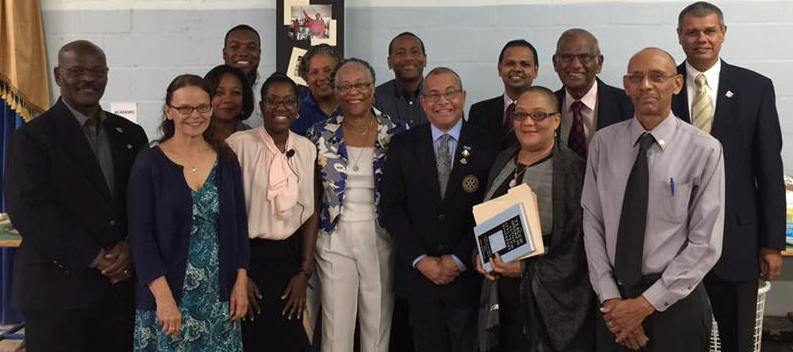2015 TEACCH Opening with DG Milton - POS, Trinidad
Page Links
Posted
on Aug 19, 2015

DG Milton on hand for the official opening of the TEACCH Programme in Port of Spain, Trinidad.
Overview
According to the 2011 Trinidad and Tobago Population and Housing Census, there are approximately 52,244 persons living with a disability (PWDs), which is equivalent to 4% of the total population of 1,328,019 (2000). Learning disabilities accounts for the greater part of the population of PWDs in Trinidad and Tobago, exceeding greatly the number of persons with physical or psychiatric disabilities. While learning disability encompasses a wide area, there are many strategies that can be applied across
multiple populations.
TEACCH (Treatment and Education of Autistic and Communication Handicapped Children) is one such methodology with multiple applications. Having a widely applicable, internationally recognized and applied, teaching strategy be implemented in Trinidad and Tobago will make resource sharing and support of schools that belong to PSSATT and the Public Special Schools Association more cohesive in their approaches to education. Additionally diagnoses of Autism are increasing internationally, Trinidad is no exception. As such teachers currently in the special education system need to be able to provide an intervention which is flexible and has a proven track record to cope with the increasing number of students with Autism coming into their classrooms.
TEACCH training will be the tool needed to accomplish this.
What is TEACCH?
TEACCH is a researched, structured method of engaging learners on the Autism Spectrum. Some of the basic principles of TEACCH are:
- Understanding the culture of autism
- Developing an individualized person- and family-centred plan for each client or student, rather than using a standard curriculum
- Structuring the physical environment
- Using visual supports to make the sequence of daily activities predictable and understandable
- Using visual supports to make individual tasks understandable
Objectives
- Train 30 -40 local teachers of private and public special needs schools in the TEACCH methods so that they can successfully obtain a certificate of participation.
Expected Outcomes
Short Term:
- Attitudes towards and opinions of learners with Autism held by teachers will be challenged so that misconceptions can be corrected.
- Learning and awareness for teachers which applies directly to their classroom population or potential population.
- More confident and skilled teachers.
Long Term:
- Improved classroom conditions for students on the Autism Spectrum and other disorders which can benefit from a structured approach.
- Create interest in persons who may choose to pursue practitioner or advanced certification.
FOR MORE INFORMATION ON TEACCH, PLEASE CHECK OUT TEACCH.COM